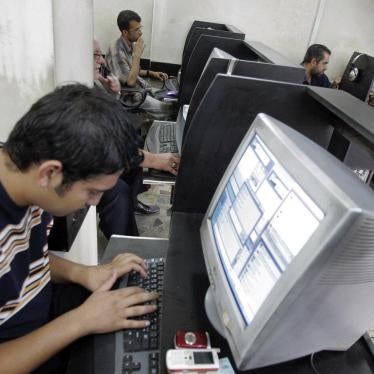(Baghdad) – A new draft law on information technology crimes would restrict free speech in violation of international law and poses a severe threat to journalists, whistleblowers, and peaceful activists, Human Rights Watch said in a report released today. The pending law includes vague provisions that would allow Iraqi authorities to harshly punish expression they decide constitutes a threat to governmental, social, or religious interests. The Council of Representatives, the parliament, should not approve the law without revising it to remove the rights restrictions.
The 16-page report, “Iraq’s Information Crimes Law: Badly Written Provisionsand Draconian Punishments Violate Due Processand Free Speech,” is a legal analysis of the draft law. It finds that the draft law is part of a broad effort by authorities to suppress peaceful dissent by criminalizing legitimate information sharing and networking activities. The proposed law had its first reading before Iraq’s Council of Representatives on July 27, 2011; a second reading is expected as early as July 2012.
“This bill would give Iraqi authorities yet another tool to suppress dissent, especially on the Internet, whichIraqi journalists and activists increasingly turn to for information and open debate,” said Joe Stork, deputy Middle East director at Human Rights Watch. “The Council of Representatives should reject lawsthat would undermine the freedoms enshrined in Iraq’s2005 constitution.”
The proposed law’s overbroad restrictions on content impose draconian criminal penalties that would silence dissenting voices, Human Rights Watch said.Article 3 provides for lifeimprisonmentand a large fine for “intentionally” usingcomputer devices and an information network to undermine the country’s “supreme economic, political, military, or security interests,” which are not defined.
Article 3 also violates Iraqis’ freedom of association by authorizing life imprisonment for involvementwith a “hostile entity for the purpose of upsetting security and public order or endangering the country.” This provision could be the basis for prosecuting anyone involved in an organization, movement,or political party that the government deems “hostile” because of the group’s criticism of the government or its policies, Human Rights Watch said.
The law as currently drafted would undermine guarantees in the Iraqi constitution of freedom of speech and assembly, and would violate the International Covenant on Civil and Political Rights (ICCPR), to which Iraq is a state party. The ICCPR holds that, “Everyone shall have the right to freedom of expression ... to seek, receive and impart information and ideas of all kinds.” International standards only allow content-based restrictions in extremely narrow circumstances, such as cases of slander or libel against private individuals or speech that threatens national security. Restrictions must be clearly defined, specific, necessary, and proportionate to the threat to the interest protected.As a state party to the ICCPR, Iraq must also guarantee “the right to freedom of association with others, including the right to form and join trade unions for the protection of [one’s] interests.”The ICCPR allows for restrictions on these freedoms, but only as provided by law and as necessary “in a democratic society in the interests of national security or public safety, public order (ordre public), the protection of public health or morals or the protection of the rights and freedoms of others.”
The report finds that this draft law fits a pattern of increasing restrictions on freedom of expression, association, and assembly. In May 2011, the Council of Ministers approved a draft of the Law on Freedom of Expression of Opinion, Assembly, and Peaceful Demonstration, which contains provisions that would criminalize peaceful speech with penalties of up to 10 years in prison. Since February 2011, Human Rights Watch has documented numerous violent attacks by Iraqi security forces and gangs, apparently acting with the support of the Iraqi government, against peaceful demonstrators demanding human rights, better services, and an end to corruption.
“How lawmakers handle this bill will be a signal to the world about the kind of country they want Iraq to become,” Stork said. “They can look backward and come down on the side of repression or they can look ahead and stand up for a rights-respecting society.”







